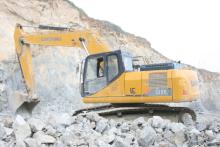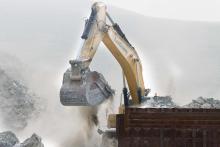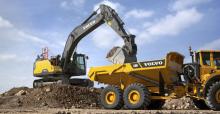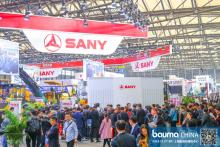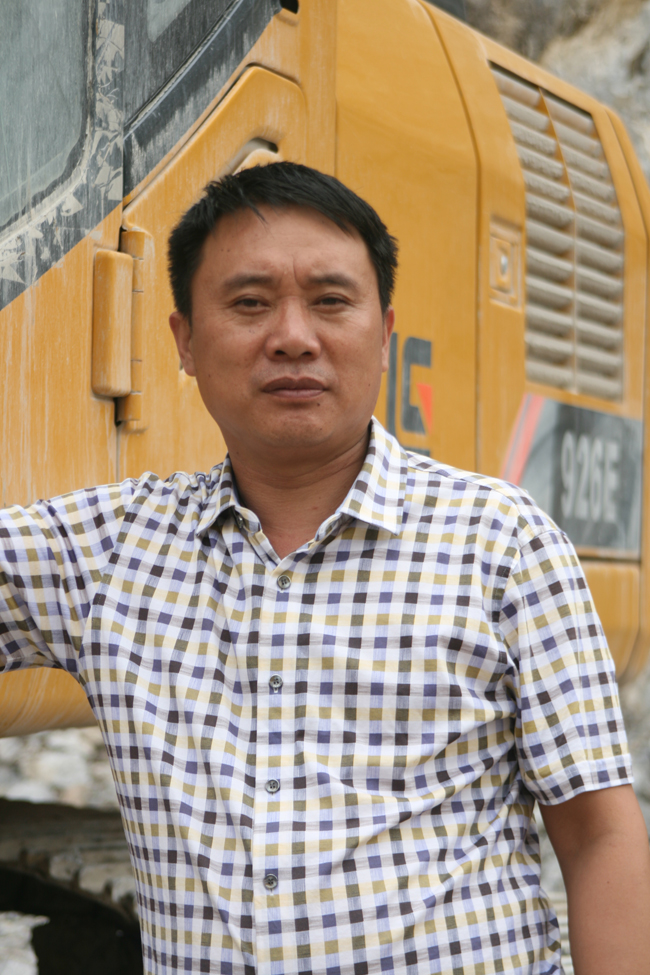
A Chinese stone processing entrepreneur has seen a big return on his continued investment in LiuGong excavators. Guy Woodford reports
Cui Zhaoquan was not always able to have complete focus on the stone processing industry. Born in Junan county, Shandong province, Eastern China, the 47-year-old used to combine his ownership and management of a stone processing plant in the city of Rizhao, in Junan, with his work as office director at the highway bureau in Jinan, capital city of Shandong.
Zhaoquan’s highway bureau job provided decent pay alongside his earnings from his stone processing plant, but he always dreamed of making life even more comfortable for his family by dedicating himself to gaining greater income through meeting rising demand for aggregates in Junan and other parts of Shandong. He quit his highway job in 2000 and moved back to Junan to take over daily management of his stone processing plant.
Zhaoquan had established his stone processing plant in 1993, after seeing huge demand at that time for construction materials, stones and sand. Twenty-five years ago, the processing rate of stone materials was low and transporting it was very inconvenient – with wheeled loaders only coming into the Chinese market in 1994. Zhaoquan was one of the first to have one. By 2000, wheeled loaders and excavators were widely used in Junan.
To expand his business, Zhaoquan needed an excavator, and in 2007 he chose a 225C model from Liuzhou, southern China-headquartered manufacturer LiuGong. As market demand increased, Zhaoquan knew it was imperative to improve his business’s productivity, and the use of excavators was key to increasing processing efficiency. Speaking about his choice of a LiuGong excavator, he says: “The first thing to consider was the price. Taking a 20-tonne excavator as an example, an imported brand excavator costs at least RMB 1.1 million (US160,000), while a domestic one costs about RMB 0.8 million ($115,000). The excavator would be used mainly for quarrying in my own factory, so the money saved can be regarded as my profit. Besides, the expensive parts and long maintenance period of an imported excavator will have indirectly affected productivity. Personally, I also feel obliged to support domestic companies.”
Zhaoquan says that choosing a LiuGong 225C excavator ahead of numerous domestic brands was based on a simple calculation. To meet a daily production target of 4,000 tonnes of stones, he employs three drivers to one excavator, with two of them working two shifts of 10 hours each every day. Despite such intensive and long working hours, the LiuGong 225C excavator, equipped with a Cummins engine which he bought separately, is said by Zhaoquan to have worked well for 27,000 hours. He adds: “High-intensity continuous operation and heavy work are very common in stone factories, so the equipment failure is understandable. But LiuGong has provided satisfactory aftersales service with fast response and quality parts. Such service attitude is welcomed by equipment owners.”
Zhaoquan was very satisfied with the low operation cost of his 225C excavator, which he exchanged in early 2016 through his LiuGong dealer for one 933E and one 936E excavator, equipped with Cummins QSB7 and 8SL9 engines, respectively. He says he is just as satisfied with the low running cost of those models, along with his LiuGong 926E excavator equipped with a Cummins QSB7 engine bought in January 2014. At first, he thought that the 926E model’s much lower fuel consumption compared to previous excavators he had used may be due to an operator being lazy on the job. But after two weeks’ observation he realised that the excavator was delivering more fuel savings and efficiency. The saved fuel cost was about RMB 30 ($4) per hour. Zhaoquan has his own way to determine whether an excavator has fully utilised the fuel, saying: “I often observe whether the excavator emits black smoke when loading.” He once experimented to compare the fuel consumption of two different brands’ excavators at the same capacity. The two
excavators were assigned the same work. While the LiuGong excavator equipped with Cummins QSB7 smart electronic-controlled engine was smoke-free when loading, the other emitted clearly visible black smoke.
The Cummins QSB7 engine is specifically designed for LiuGong excavators. It is equipped with Cummins’ new generation CM2880 electronic control module, featuring fuel saving, electronic control functions and easy adaptability to different fuel use. The module operates a high-pressure common rail fuel system to better atomise fuel, while its electronic injection technology directs the engine to allocate power more intelligently, depending on the 926E excavator’s given application. This makes the excavator more fuel efficient while ensuring sufficient power.
The 926E excavator has proved itself to be durable and reliable by working for nearly 2,000 hours in over seven months without breakdown. LiuGong says the long uninterrupted usage and low cost of the 926E has seen it set several records at other construction sites, leading to it being called the ‘money-digger’. LiuGong says it is common for the machine to work 20 hours a day over 10 consecutive months, with maintenance intervals extended up to 500 hours.
Zhaoquan says the fact that his operators enjoy driving LiuGong excavators is another key factor in his purchasing decisions. “Those drivers are working for me, so I do my best to pay them well and take their suggestions seriously when making purchasing decisions. They’ll go with me to test drive excavators and give me their opinions. Every driver spoke highly of the 926E excavator during the test drives.”
Speaking about the maintenance of his excavators, Zhaoquan says: “I will definitely choose original accessories. Those are more expensive, but they have been proved better than the market replacement. They can guarantee the excavators’ reliability during intensive work.” For convenience and lower cost, some Chinese excavator owners get company personnel to deliver fuel from various sources to sites where excavators are working. However, Zhaoquan says this does not appeal to him. “The fuel I use in my excavators is all supplied by large fuel stations. Although private fuel is cheaper, it’s hard to ensure the quality. If anything goes wrong, the loss would outweigh the gain.”
Equipped with his trio of LiuGong excavators, Zhaoquan’s business has expanded from stone processing to also take in earthwork, real estate and road construction. In the future, the entrepreneur says he may choose a large-tonnage LiuGong excavator to further improve the efficiency and revenues of his stone processing operation.

